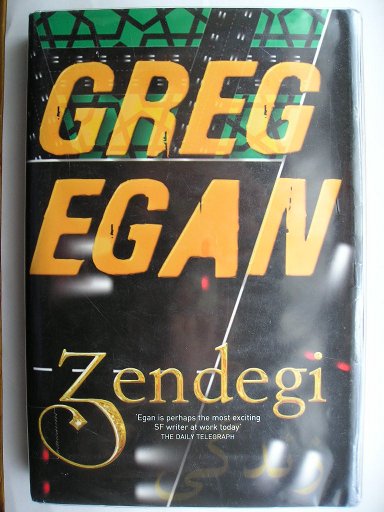
The novel “Zendegi” by Greg Egan was published for the first time in 2010.
Martin Seymour is an Australian journalist sent to Iran to cover the parliamentary elections. The religious authorities manage to have many opposition candidates exclude and this causes the start of a series of popular protests, especially among young people. When a member of the government is discovered in a compromising situation, the political consequences for the Conservatives are heavy. Martin ends up staying in Iran to cover this turbulent period in the country’s history.
Nasim Golestani lives in the U.S.A. after she and her mother fled Iran following the murder of her father by the regime’s secret police. She’s working at MIT on a project that has the aim to reproduce the neural map of a human brain. When her project is turned down by American Congress denying the necessary funds to continue its development, she decides to return to Iran.
Greg Egan started writing “Zendegi”, a word which in Persian means “life”, in early 2008. To improve his knowledge of Iran, Egan spent two weeks there in the course of that year and published a sort of trip diary in the section of its website dedicated to the novel.
The first part of “Zendegi” is set in 2012 and is mainly used to lay the foundation of the novel. In the end, the most sci-fi element of this part is that Iran is able to overcome the phase in which the religious authorities hold the real power without a bloodbath. The second part of the novel starts in 2027 and tells the development of the human brain mapping and virtual reality technologies.
Greg Egan’s novels are often set in the distant future or anyway in very exotic scenarios with post-humans and / or aliens but also with incredibly advanced technologies. On the contrary, “Zendegi” is set in the near future and actually it starts in 2012, which is now the past. The particular choice really is to set the novel for the most part in Iran.
The protagonists of “Zendegi” are often common human beings, with their merits and flaws. The technologies described in the novel are those we can expect to be actually developed in the coming years.
In my opinion, the main problem with “Zendegi” is that in a sense it ends up leaving the story unfinished. There’s a reason for this choice by Greg Egan and when you reach the end of the novel you can see that it has an ending but in a novel that covers technological developments that have been going for 16 years, I expected that eventually they’d reach greater developments.
The impression is that Greg Egan was interested in telling about the initial stages of the development of the technologies described in “Zendegi” more than about their possible applications once they’ve become available. In particular, the author focuses on people’s reactions to these technologies: someone welcomes them, especially young people, but there are those who are opposed to them for various reasons, often irrational.
For Greg Egan the contrast isn’t just between the good guys who develop new technologies and the bad guys who oppose them. Even when this development is being carried out with the best intentions, there are ethical issues that must be addressed in a period of transition towards the adoption of technologies that can bring huge changes, even social ones.
Again, the story reaches a certain point when it could be further developed. It’s as if Greg Egan wanted to finish this part of the novel too but by doing so the development of the ethical considerations related to the technological progress remains limited.
In the end, “Zendegi” is a novel that in some ways develops the human side of the story more than the technological one. Greg Egan is one of the most important hard science fiction writers so this may sound strange but it’s not the first time that the author makes such a choice in one of his stories. In this case, that’s made easier by the fact that the technological side is directly related to human one as the neuroscientific subject is one of the bases of the novel.
In the first part of “Zendegi” there’s also a good amount of action since it describes the political unrest in Iran. In the second part of the novel the action is very often virtual but the pace of the story is still fluent.
In my opinion, overall “Zendegi” is a good novel but because of the flaws I described I feel I can recommend it only to Greg Egan’s fans and to the readers who like the type of themes it deals with.

